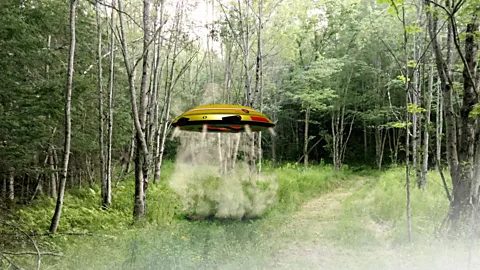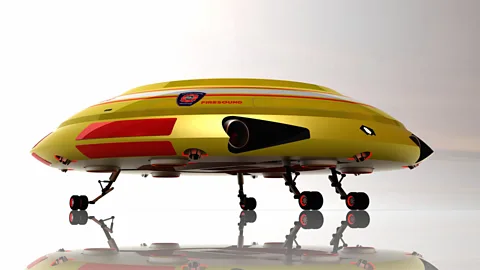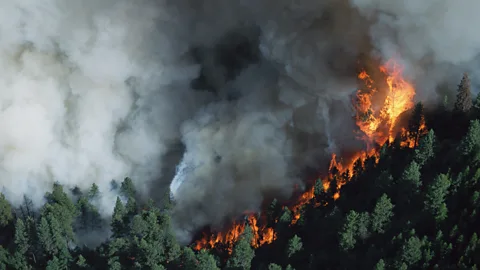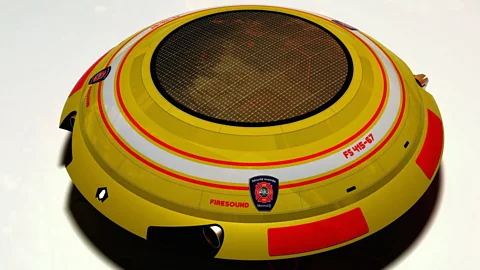A flying saucer that fights fire with sound

 Charles Bombardier
Charles BombardierFighting forest fires can be a huge challenge, as they’re often in remote areas, hard to reach. One inventor thinks a flying saucer might be the answer – using sound waves to quell the flames.
Despite the conspiracy theories, the first time we actually encounter a hovering disc in the sky equipped with advanced technology, it might be here to save us, not to enslave us.
The Firesound is a firefighting flying saucer. The bright yellow, meter wide, autonomous disc is designed to patrol parks and forests, constantly looking for danger using smoke sensors and thermal cameras. Unlike UFOs from 50s B-movies, however, it won’t shoot out the kind of laser beams that might spark a forest fire, the Firesound will blast low frequency sound waves to extinguish small fires before they can spread.
Around 90% of wildfires in the US are started by humans, some as deliberate acts of arson but most unintentionally. Throwing away a still-glowing cigarette or leaving a cooking fire to burn unattended can have disastrous consequences in a dry forest.
 Charles Bombardier
Charles Bombardier“In national parks around the world, we have people who start campfires and then leave in the morning without putting out the fire properly,” says designer Charles Bombardier.
“These drones could be used by park officials to inspect each site and make sure that all the campfires have been extinguished.”
Firesound is a concept. Although most of the technology needed to build it does exist, nobody has combined it into a super-saucer… yet.
Bombardier’s proposed saucer is an electric drone, powered by a hydrogen fuel cell. Four fans placed around the edge of the disc provide propulsion. Air intakes at the front and back, and exhausts underneath, are used for thrust and changing direction.
He is not the only person looking at drones as potential firefighting tools. As their price falls, fire departments around the world are looking at them as an “eye in the sky”. That overview of a fire – especially a large one - can help an incident controller make decisions about the best place to deploy firefighters during a large blaze. Additional sensors such as thermal cameras can literally help identify the fire’s hotspots.
The Firesound, however, goes a step further. The firefighting abilities are the most impressive part. Already, low frequency sound has been demonstrated as a firefighting tool; it effectively moves air just enough to starve a fire of oxygen.
 Getty Images
Getty ImagesWhen Bombardier read about this work, he realised these sounds could be the ultimate wildfire fighter. The saucer would not need to carry heavy loads of foams, liquids or powders. A good blast of 30 to 60Hz bass (which is just about audible) does the trick, and leaves no trace on the natural environment.
“I see the Firesound as a tool for surveillance too,” says Bombardier.
“It could be used to locate people who are missing, or even provide WiFi coverage to a small area,” he adds. That might be enough to provide connectivity to a seemingly stranded camper.
The Firesound is not the only futuristic concept that Bombardier is working on. He has a reputation as an inventor and investor. But he doesn’t necessarily want to bring his designs into the physical world. Once he has developed a concept from the initial idea he is happy to make it public and move on to something, in the hopes of inspiring others into taking it further. He has a strong pedigree – the Bombardier family is famous for the development of Canadian trains, and planes, and even snowmobiles.
 Charles Bombardier
Charles Bombardier“There's a whole lot of ideas that are sitting on the shelves of scientists, that could be turned into a creative content like the Firesound,” he says.
“It just need somebody to go find them, and expand on them.”
If Bombardier has his way, the expansion has only just begun. Keep watching the skies.
If you liked this story, sign up for the weekly bbc.com features newsletter, called “If You Only Read 6 Things This Week”. A handpicked selection of stories from BBC Future, Earth, Culture, Capital, Travel and Autos, delivered to your inbox every Friday.
